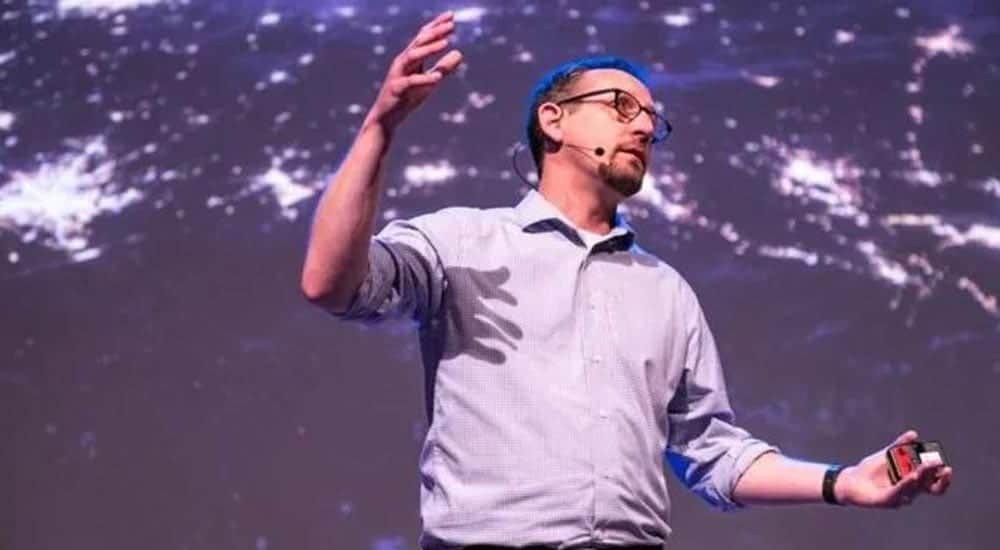“Our mission this year has been to bring the benefits of the Cloud Foundry developer experience to Kubernetes clusters everywhere,” Cloud Foundry Foundation CEO Chip Childers said in his keynote on the first day of the virtual CF Summit 2020 Europe. He wasn’t on stage in front of an empty auditorium or in a professional studio – he was in his own home (the header picture is from last year’s CF Summit in The Hague, Netherlands), with no flashy graphics being displayed on a green screen behind him, no music to fill the occasional pauses. It was a very low-key keynote which set the tone for the rest of the event, with most sessions having been recorded in speakers’ own homes and on their own devices. There were some slip-ups, some gaffes, but it made it feel more real, somehow. As Dieu Cao, CF Open Source Product Lead at VMware said in her keynote on day 2 of the CF Summit, “It will be a little awkward, but it will be fine.”
The whole event felt less produced than other recent virtual conferences, focusing more on community engagement than smooth presentations or celebrity keynote speakers. “We have a community with an aligned vision right now”, Childers said during a preliminary press conference. “The Cloud Foundry Foundation’s focus is really just on being an effective home for the collaboration of the community.” Dieu Cao also doubled down on this message in her keynote, emphasizing that she wants to call on all community members “to share knowledge, collaborate openly, and engage with users and contributors”.
Project updates: cf-for-k8s, KubeCF, Stratos
Besides the renewed commitment to community engagement, the CF Foundation announced project updates, mostly concerning extensions and solutions for Kubernetes. “What is Cloud Foundry? A developer experience for Kubernetes,” Chip Childers said, adding, “While there is more work to be done, make no mistake about it: Development teams, large and small, can take advantage of Cloud Foundry to simplify the deployment of Kubernetes clusters.”
During the CF Summit, the Foundation announced the release of version 1.0 of cf-for-k8s, the release of version 2.5 of KubeCF, and the release of version 4.2 of Stratos. Project teams have spent the last few years evolving the Cloud Foundry architecture to include Kubernetes and other cloud native open source projects, and they have exciting results to show for it. You can find more information on these updates here.
Production-ready Eirini?
The new features in KubeCF v2.5 include production-ready Eirini. “What does it mean to be production ready? The term means many different things to many different people,” said Dimitris Karakasilis, software developer at Suse, in a CF Summit session called ‘Eirini: To Production and Beyond!’. “We think there are three main components to being production ready: feature completeness, stability, and support.” Karakasilis and his co-speaker Julian Skupnjak, software engineer at IBM Cloud, delved into this topic in depth during their session, but Skupnjak (or Herr Julz, as he is known in the community) summed it up pretty well, “Eirini is ready to use for single tenancy, definitely. It’s robust enough, it’s mature enough – just go ahead and use it!”
Member news from the CF ecosystem
There have also been some announcements from CF community members like Alibaba, Suse, SAP, and many more. Here are some highlights:
- Alibaba announced Cloud Lakehouse, the next-generation analytics architecture that can deliver significant data-based values and intelligence through cross-platform computing, intelligent cache, hot/cold data separation, storage improvement and performance acceleration.
- Atos announced that the certified Atos Cloud Foundry Platform has been enriched with the adoption and on-boarding of the different flavors of Eirini, Quarks and KubeCF, enabling customers to take full advantage of container technology powered by Kubernetes and cloud native applications.
- Mendix for Private Cloud announced Mendix’s low-code development platform and cloud-native architecture to Kubernetes deployments on any private or hybrid cloud environment.
- SAP announced that Gartner has named it a Leader in the 2020 Magic Quadrant for Enterprise Integration Platform as a Service (EiPaaS), as well as a Leader in the 2020 Magic Quadrant for Multiexperience Development Platforms (MXDP).
- Suse announced that Suse Cloud Application Platform 2.1, the latest version of Suse’s modern application platform for Kubernetes, is now available. It deepens Cloud Foundry integration with Kubernetes to expand the ecosystem of third-party tools available to users, and it simplifies application and Kubernetes cluster management.
During the above-mentioned press conference, Chip Childers was asked if he thinks that the increasing commercialization of Cloud Foundry could have a negative impact on the community. He responded, “I think it’s wrong to think about the commercial vendors and the community as two separate entities. Cloud Foundry depends on contributions and engagement, and at the end of the day, who is going to put the most money into it? The commercial vendors. So, really, the vendors are an essential part of the community.”





















Add Comment